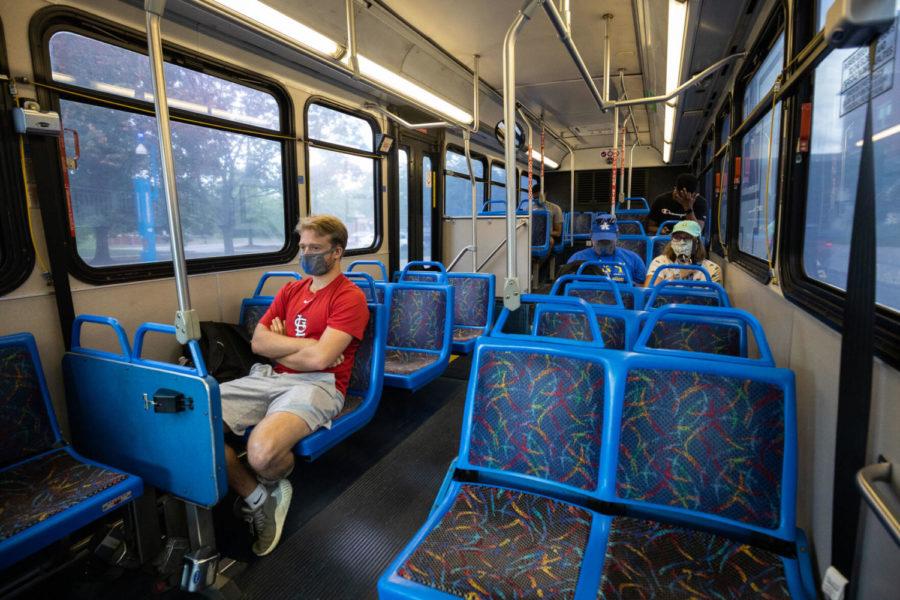Bus drivers cite lack of sanitization, overcrowding in COVID-19 concerns
August 31, 2020
Lextran employees who operate the buses on and around UK’s campus say the buses are not being properly sanitized to prevent the spread of COVID-19, and that campus buses are not cleaned as often as city buses.
But University of Kentucky Transportation Services says campus and city buses are being sanitized the same way and at the same frequency.
Lextran suspended many of its routes in Lexington when COVID-19 first hit Kentucky and many Lextran employees who were once bus operators became bus sanitizers instead.
“We had extra drivers because Lextran wasn’t running the service anymore while COVID-19 was going on, so instead of laying the drivers off, the union got together with management and decided to let them sanitize the buses during the daytime. Every time the buses pull into the transit center, they would go in, spray them and wipe certain areas down,” said Steven Richardson, a Lextran mechanic and the president of Amalgamated Transit Union Local 639.
But since school started and Lextran has gone back to full service, the drivers had to go back to their bus routes, and there are fewer people at the transit center cleaning buses, according to Richardson.
“They said they were in the process of hiring some people. They knew two months in advance how they are going to schedule the runs; that was just an excuse for them not to pay someone to do it,” Richardson said.
Buses that have routes on UK’s campus do not go through the transit center throughout the day like the regular city buses, Richardson said. This means that campus buses are not getting cleaned until the end of the day.
“They don’t get sprayed down like they do downtown,” Richardson said.
“The way it works downtown, every time they come in from a round trip, there’s supposed to be someone down there wiping the bus down and spraying it down, but UK doesn’t get that.”
“I haven’t had sanitizing done to my bus yet,” Kim Abdullah, a UK bus operator who has been with Lextran for 14 years, told the Kernel on Aug. 21. “Sometimes we don’t have but one person [to clean], but he can’t clean 15 buses that go different routes.”
Lisa Cleveland, communications officer for UK Transportation Services, said told the Kernel that all buses are being cleaned regularly.
“Bus sanitation is handled in the same manner on all buses, including city and campus transit. Each night, the buses undergo electrostatic disinfection. High touch areas are also periodically wiped down during the day,” Cleveland said. Cleveland coordinated her answers to the Kernel’s questions with Lextran.
Richardson said the cleanings may not be good enough.
“All the buses get sprayed at nighttime when they come in at the end of the day, but the stuff they got is not a miracle, it’s not going to cure COVID-19,” Richardson said.
Some drivers also say there are too many passengers riding on buses.
“It gets crowded and packed on there. Sometimes we have up to 50 to 80 to 90-something students… I can’t afford to get sick,” Abdullah said. “It’s a safety issue. With all of those people, we can’t limit.”
Cleveland said drivers are responsible for managing passenger loads, but Abdullah says there is no way to control high numbers without coming into contact with bus riders.
Campus and city buses are operating at half of maximum capacity, Cleveland said.
“On the large transit style buses operating on UK’s Blue and Yellow routes, the designed maximum capacity is 75 passengers and these buses are designed to accommodate standing riders,” Cleveland said. “To achieve reduced capacity, the total occupancy is now limited to 37 and all passengers are asked to have a seat.”
Like anywhere on campus or in Kentucky, drivers and passengers are required to wear face masks while waiting or on the bus, according to Lextran.
“Both campus and city bus drivers are required to wear face masks, as are all passengers on the buses. Face coverings are also required when waiting for, loading, riding and unload- ing both city and campus transit,” Cleveland said. “Drivers have also been provided with hand sanitizers for their own individual use.”
Passengers are also being asked to board and exit through the rear doors only, said Cleveland, “in an effort to limit the driver’s exposure to every passenger.”
Similar to the daily health screenings UK students must complete, Lextran drivers are required to complete daily health screenings every day.
Cleveland said Lextran drivers who drive a UK route are eligible to receive a free COVID-19 test.
But Richardson said what UK is offering isn’t enough.
“When the driver’s report to the garage in the morning to start their shift or their run, they go through a screening process,” Richardson said. “They point a thermostat gun at you, and ask you if anything has changed, or have you been out of town. And if you answer no to those two questions, they slap you with a wristband and send you through the door. It’s one of those things where they just have someone sitting there so they can say that they’re following procedures.”





























































































































































